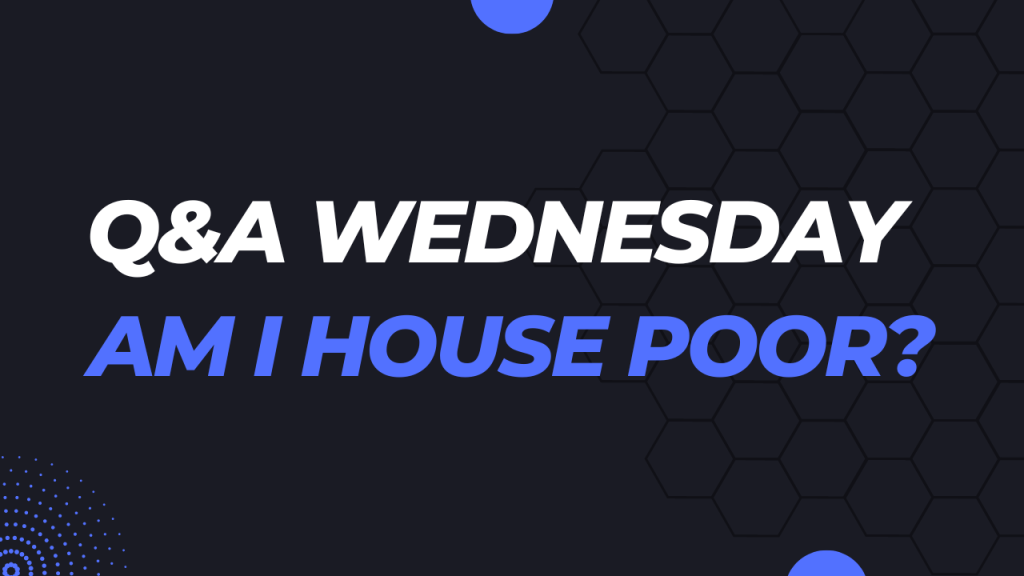Welcome to Q & A Wednesday on Millionaire Habits, where I answer one of your questions every week for the benefit of over 26,000 people.
💡 Question: “Steve, someone just called me house poor. What does that mean, and is it true?”
Being “house poor” means you’re spending way too much on your home mortgage or rent, but sometimes being house poor isn’t obvious.
How do you know if you’re house poor, and more importantly, is there a way to right the ship? Hell yes to both. Let’s dive in.
How do I know if I’m house poor?
Being “house poor” refers to a situation in which a significant portion of your income is being allocated to housing expenses, leaving you with limited funds for other essential expenses and financial goals.
And like I said, it’s not always obvious.
If you’re wondering whether you might be house poor, here are some signs to look out for:
High Percentage of Income for Housing: If 30% or more of your monthly expenses go towards mortgage/rent, property taxes, homeowners’ insurance, utilities, and maintenance costs, you might be house poor.
Struggling to Cover Basic Expenses: If you find it challenging to pay for everyday necessities like groceries, transportation, healthcare, and other essentials due to the high cost of your housing, you might be house poor.
Limited Disposable Income: After paying for housing and basic necessities, you may have little discretionary income for entertainment, leisure activities, or personal expenses.
High Levels of Debt: If you are forced to rely on credit cards or loans to cover regular expenses because your housing costs consume most of your income, that’s a sure-fire sign that you’re house poor.
Sacrificing Other Financial Goals: House-poor individuals might find it challenging to invest in education, start a business, or make other significant financial commitments due to their limited financial flexibility.
Difficulty Building Equity: If your housing costs are so high that you can’t afford to make extra payments on your mortgage or save for a larger down payment, you might have trouble building equity in your home.
If you recognize several of these signs in your financial situation, it’s essential to reassess your budget and financial priorities.
If you think you might be house poor, what can you do about it?
What can I do about it if I am house poor?
If you’re house poor (or on the verge), don’t worry. This won’t destroy your life. The important thing is to start addressing it NOW.
Here are some steps you can take to alleviate the burden and stop being house poor:
1: Create a budget: Start by tracking your income and expenses to get a clear understanding of where your money is going. Create a detailed budget that includes all your monthly income and expenses, including housing costs, utilities, groceries, transportation, debt payments, and other necessities.
2: Reduce housing costs: Consider refinancing your mortgage if interest rates have dropped since you bought your home (unlikely in this economy, but it never hurts to find out for sure). Also, explore the possibility of downsizing to a more affordable home or renegotiating your rent if you are renting.
3: Cut discretionary spending: Identify areas where you can reduce non-essential expenses such as dining out, entertainment, subscriptions, or impulse purchases. Redirect these savings towards your other financial goals.
4: Increase your income: Look for opportunities to increase your income, such as taking on a part-time job, freelancing, or starting a side business. Use the additional income to build a buffer against housing costs.
5: Refinance high-interest debts: If you have high-interest debts (such as credit card debt), consider consolidating or refinancing them to lower interest rates. This can free up more money for housing and other expenses.
6: Negotiate bills and contracts: Contact your service providers to negotiate better deals on your internet, cable, phone, and other utilities. Many companies offer discounts or promotions to retain customers.
7: Prioritize savings: Make saving a priority. Set up automatic transfers to a savings account each month to build an emergency fund and contribute to long-term savings, such as retirement or education funds.
8: Seek financial advice: Consult a financial advisor for personalized advice and strategies to improve your financial situation. They can help you create a plan tailored to your specific circumstances.
9: Consider roommates or co-living: This won’t be right for everyone, of course, but consider getting a roommate or exploring co-living arrangements to share housing costs.
Remember, breaking the cycle of being house poor may take time and discipline. Making gradual adjustments and staying committed to your financial goals will help you achieve greater financial stability and reduce the burden of housing costs.
Chat later,
– Steve



